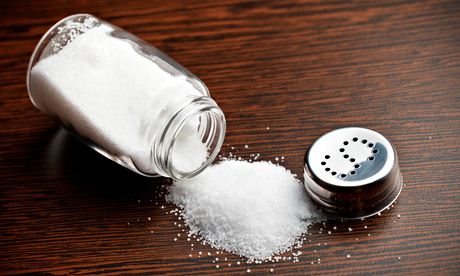
Declining consumption of salt in recent years has been the key factor in the large fall in the number of people dying from a heart attack or stroke, research published today claims.
A 15% drop in average daily consumption of salt in England between 2003 and 2011 played an important role in the 42% fewer stroke fatalities and 40% drop in those dying from coronary heart disease, according to the study published in the medical journal BMJ Open.
The researchers, who include Britain's leading campaigner against added salt in food, claim that diminishing levels of salt was "an important contributor" to falls in blood pressure over the eight-year period. "As a result, the decrease in salt intake would have played an important role in the reduction of stroke and ischaemic heart disease mortality during this period," say the authors.
Deaths from cardiovascular disease in the UK have more than halved since 1971, falling from 335,000 to 161,000 in 2012.
Between 2003 and 2011 mortality rates from stroke dropped from 134 to 78 (42% down) per 100,000 population, and from 232 to 139 (40% down) per 100,000 population for coronary heart disease.
Average salt intake fell from 9.5g a day to 8.1g (15%) a day between 2003 and 2011. That was largely due to efforts by the Food Standards Agency to persuade food manufacturers to gradually reduce the amount of salt they added to their products.
The authors acknowledge that several other risk factors for cardiovascular disease also declined during the study period, including average cholesterol and smoking, although average weight as measured by Body Mass Index rose, as did consumption of fruit and vegetables.
They reached their conclusions after analysing various official sources of health and lifestyle data, including several years of the Health Survey for England and the national diet and nutrition survey, which used urine samples to gauge salt levels.
Co-author Graham MacGregor, a professor of cardiovascular medicine at the Wolfson Institute of Preventive Medicine at Queen Mary University of London, said the results vindicated the FSA's prompting of food producers to cut salt levels, including by setting targets. He is also the chairman of the pressure group Consensus Action on Salt and Health (Cash), which lobbied ministers at the time for the FSA to make salt reduction a priority.
The coalition, which has been criticised for relying on voluntary deals with the food industry to tackle health problems by making products healthier, last month published new targets for further falls in salt intake to be achieved by 2017. But ministers must be prepared to regulate to impose targets if food producers refuse to cooperate, MacGregor argued.
Clare Farrand, programme lead for World Action on Salt and Health, said: "It would now be a gross breach of ethical and corporate responsibility for companies not to reduce salt as the benefits of salt reduction are now so clear."
However, some experts suggested that the new paper overplayed the extent to which declining salt intake could be credited with the fall in heart attack and stroke deaths. Patrick Wolfe, professor of statistics at University College London, took issue with the authors for assuming that the improved blood pressure seen in the 2003-2011 was largely the result of reduced salt intake. "Plausibility of assumption does not equal evidence," he said.
David Spiegelhalter, professor of the public understanding of risk at Cambridge university, cited the researchers' admission that the fall over that time in systolic blood pressure would be expected to reduce strokes by just 11% and heart attacks by 6%, small amounts of the total falls. Reduced blood pressure did not represent the authors' claimed "substantial contribution" to the reduced death rates.

